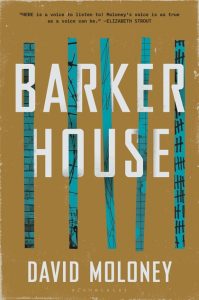I was twenty-four, into my second year as a corrections officer at a county jail, when I decided to start taking notes. I had dabbled in shitty poetry, mostly free verse shape poems that relied on heavy thesaurus use. I wrote short stories about white men who liked to drink, very Bukowski-esque, mainly because he was the only writer I consumed during that time: his novels Post Office and Factotum, about working while hungover, angry bosses, the monotony of guarding over the confined. I didn’t consider myself a particularly good writer, at the time, because my stories weren’t based in reality. (Bizarre dream sequences. A mafia hitman who was dyslexic.) So, I turned to reality, my employment, the population I guarded over, as material.
There was a time in my four years at the New Hampshire jail where a band of inmates on the Restricted Housing Unit decided to throw their feces at us. For a solid six months, the half-dozen inmates, all young and in their early twenties, were led by a career criminal who they referred to as Uncle. He was able to mold them like any successful cult leader would. His followers were crestfallen, solitary, and disillusioned with society. To act out against who they deemed the enemy—the officers—required ingenuity. They were mostly scrawny, allowed out of their cells in groups of two or three, so they didn’t stand a chance against the officers physically. Inside their cells, they were given a small Bible, toilet paper. I like to think they used their feces as a weapon because it was all they had at their disposal. Uncle became my adversary. I would think of him while showering, or driving, and it’d rile me. My mood would change if I saw someone that resembled him: white goatee, muscular neck. He entered my dreams, disrupted my sleep.
So, I went and wrote a story titled “McShit Burgers.” It detailed, in all-too-realistic detail, the events I dealt with and lived through for those months. I awoke each day readied to walk on the tier and scoop up the shit burgers, milk carton shit bombs, eat verbal abuse with a smile. How I left my boots outside my apartment. How I drank to numb. How. How I’d internalize the stress and binge bad food that comforted me and fight with my girlfriend because those encounters felt safe. Uncle was the conflict of the story, the villain. When I sent it to a mentor and a few friends in my writing group, they all relayed the same feedback: the story had no arc. No tension. No main character.
I couldn’t understand it. I told the story exactly how it happened. Uncle is the tension. I am the main character. A writer-friend said, “I’m not sure what you want readers to take away from this story. I don’t think you even know.” And another: “Your narrator doesn’t change. He is a flat line. He’s more of a reporter, not a character.”
I couldn’t understand it. I told the story exactly how it happened.
What matters in a true story we care about, and how do we make readers care? That was my next step. I can still tell jail stories for days, sometimes I do, at a bar or cookout. My previous employment is great conversation. But what about those stories makes good fiction? I had to really face that question. Was my narrator, Officer O’Brien, a flattened version of me? A vessel for the boring truth of my life? What if I took real stories but allowed them to stray from the truth, way far away. What if I stopped being loyal to my slice of reality.
McShit Burgers never made my novel. Or it made it in as background: one small scene that encapsulates what little recourse inmates have at mistreatment. I began to understand that to tell a true story in fiction was to make the reader care about the characters first, and then sprinkle in the interesting details of reality after.
Another true story: a fellow officer, a partner of mine for many months, suffered a difficult loss. His wife of twenty years decided she was done being a mother, and ghosted him. They had two children, one in their teens, one a bit younger. He became a single dad overnight. His teenage son began sleeping in his bed with him. There was tension and anger. He sought guidance from twenty-three-year-old me. I could barely keep myself alive at the time. But, I felt his loss, his new role. I always wanted to write about this scenario but I didn’t want to betray his trust. Another close friend has grand mal seizures and has given me insight over the years about what happens before, during, and after a seizure.
These men I know who are dealing with these new realities morphed into characters. I stole them, combined them, they became one, and they became new, a man who lost his wife to reasons he will never know, while now dealing with a debilitating disease and he has lost complete control. And they also became me: a man working in an impossible environment.
We all have stories that we believe to be interesting. But maybe they are only interesting to the people who know us, or already have the pertinent details, the history. I used details from my friends’ lives, but also had to face difficulties of my own. What we do as fiction writers is exactly this. Every character I write is me. Every character I write is someone I have met. Every character I write is someone I know deeply. Every character I write is also someone I am just meeting for the first time.


















